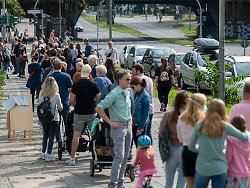Friday October 15, 2021
Avoidable shortcomings in choice
Federal Returning Officer examines objection in Berlin
The CDU can look forward to an additional seat in the Bundestag. She receives a mandate from the state list in North Rhine-Westphalia. But the work goes even further for the Federal Returning Officer – he is investigating whether he will object to the validity of the election in Berlin’s constituencies.
Federal Returning Officer Georg Thiel has confirmed the final result of the federal election on September 26th. At the same time, he announced in Berlin that in the coming days he would “further investigate” whether he would appeal against the validity of the election in individual constituencies of Berlin. Most of the incidents were due to organizational deficiencies, all of which could have been avoided.
According to Thiels, there are no changes in the second vote result compared to the provisional result from election night: The SPD comes to 25.7 percent (2017: 20.5), the Union to 24.1 percent (32.9), the Greens to 14.8 percent (8.9), the AfD to 10.3 percent (12.6), the left to 4.9 percent (9.2), as Thiel announced in Berlin at the meeting of the federal electoral committee. The turnout was 76.6 percent (2017: 76.2 percent). However, compared to the preliminary result, the CDU wins a mandate through its state list in North Rhine-Westphalia. The Union now has 197 seats. That is due to a second vote increase of 4491 votes for the CDU, said Thiel.
The rest of the distribution remains the same: 206 seats for the SPD, 118 for the Greens, 92 for the FDP, 83 for the AfD, 39 for the Left and 1 seat for the South Schleswig voters’ association (SSW). Compared to today, the Bundestag will grow by 27 to 736 members.
There were numerous mishaps in Berlin on election day. In the capital, citizens were called upon to vote for the House of Representatives, for district councils and a referendum on the expropriation of large housing companies in addition to the general election. At the same time, the Berlin Marathon took place with many road closures. Long queues formed in front of polling stations, many restaurants stayed open longer than usual, sometimes voting papers were missing or there were false voting papers.
